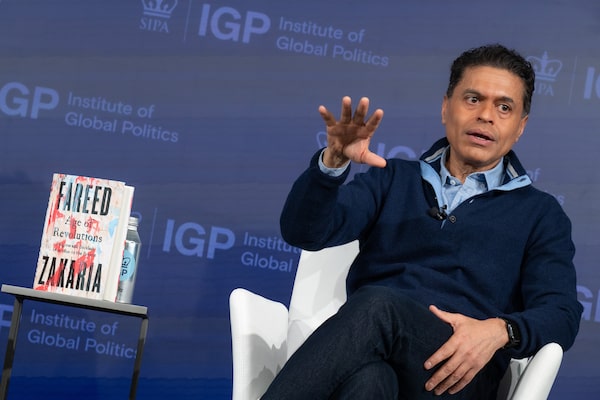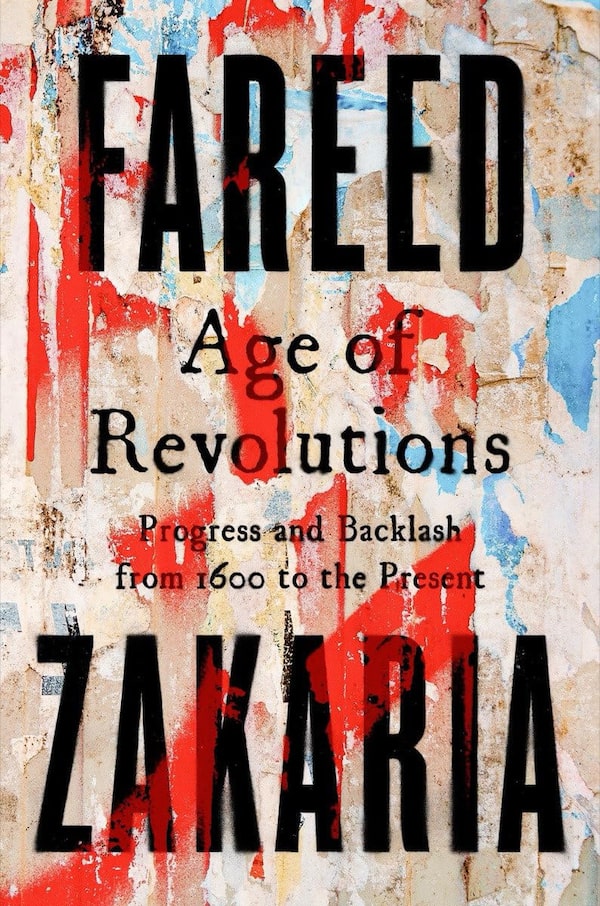
CNN host, Washington Post's columnist and NYT best-selling author Fareed Zakaria speaks during a book talk for his new book, Age of Revolutions: Progress and Backlash from 1600 to the Present, at Columbia University’s School of International and Public Affairs on April 3 in New York City.Shahar Azran/Getty Images
- Title: Age of Revolutions: Progress and Backlash from 1600 to the Present
- Author: Fareed Zakaria
- Genre: Non-fiction
- Publisher: W.W. Norton
- Pages: 400
In the middle of the upheaval, destruction and death of the French Revolution, did many Parisians pause to read a book? Did anyone in Tehran do so during the Islamic Revolution? How about the American Revolution? Did the patriots who mustered at “the rude bridge that arched the flood” – the opening words of Ralph Waldo Emerson’s Concord Hymn, his description of the site of the first 1775 skirmishes of the rebellion – pull out a book and start to read?
But now, deep into our contemporary revolution – in business, arts, politics, technology, gender identity, communications and every other element of the culture – we might consider lingering among the pages of one of the season’s most provocative books, Age of Revolutions: Progress and Backlash from 1600 to the Present.
This week's book recommendations from Globe staff and readers
This offering – this invitation to contemplate our moment, and the disruption that envelops us, in our homes and workplaces, in North America and beyond, within and among nation states, terrorist groups and immigrants’ camps – comes from Fareed Zakaria, the polymath CNN commentator and Washington Post columnist. He has graciously volunteered to be our docent in what he describes as “a world in overdrive, with accelerating technological and economic change, fluctuating conceptions of identity, and rapidly shifting geopolitics.”
In examinations of revolutions beginning with the rise of the Netherlands in the late 16th century to our own time, Zakaria traces the revolutionary idea and the implications of revolution, with fresh and welcome emphasis on perhaps the most important, and surely the most surprising, word in his subtitle: backlash.
For it is backlash – a kind of Newtonian response, every revolution producing an equal and opposite revolution – that we are witnessing today. The specific contemporary backlash is to globalization and the vast accumulation of wealth both in the West (North America, especially) and within individual countries, along with angry reactions to the liberal order domestically and in the liberal post-Second World War world order globally.
The products of this backlash: the resentments of Russia and China. The rural/urban and rich/poor divisions in the West, including Canada. Surges of emigrants in Europe and North America. Populist movements around the globe. The breakdown of conventional politics, especially in Washington. And, of course – he’s present in every conversation, every contemplation, every rumination – the most ubiquitous figure of the age, Donald Trump.

Supplied
One of the implications of our time: “Today, the fundamental challenge this world order faces is that the country that imagined, constructed, and sustained it – the United States of America – no longer has the capacity or desire to play that hegemonic role.”
This rupture in the global order has prompted new fears, and a new geopolitical calculus, around the world – and especially in Canada, where diplomats and academic thinkers are contemplating the way forward in circumstances where the U.S. is not capable, or willing, to lead, or even to engage.
In this context, Zakaria examines earlier periods of upheaval, reminding us, if not actually assuring us, that upheaval is one of earth’s great constants.
The Dutch provide a formidable if much-forgotten example. The United Provinces of the Netherlands became the richest country in Europe; promoted great art (Rembrandt and Vermeer); tolerated if not cultivated disruptive thinking (Descartes and Spinoza); was unusual for the time in having a government that rejected an absolute monarchy; and in its irresistible ascent cultivated an urban power base while the rest of the world remained rooted in rural life.
But all this sowed divisions eerily familiar to us today: resentments between rich and poor, tensions between free trade and protectionism, antagonism between the city and the country, a nostalgia for a mythic romantic past.
The Dutch experiment took root in Britain with the Glorious Revolution. There – as in the Netherlands, as in North America today – stability and security, especially in rural areas, gave way to a “modern society that was wealthier but marked by insecurity, flux and inequality.” But the English result was an admirable stability, economic as well as political, that came with the political balance between the monarchy and Parliament. It endures to this day. “The Glorious Revolution did not put one party in power permanently,” Zakaria writes. “Rather, it was a bipartisan escape from dangerous polarization.”
The French Revolution is a different story – a failure in many dimensions. “The shadow of that revolution, with its polarization and extremism, extends across history,” he writes. That revolution, and the ascendancy of Napoleon, illustrate an important truth we see confirmed repeatedly in modern times: “Throughout history, we see again and again conservative elites who underestimate a populist strongman, thinking they can use him as a mere figurehead without ceding power.”
Above all these revolutions, in the Zakaria assessment, stands the Industrial Revolution, which produced “almost every aspect of the of the modern world we take for granted today – rising incomes, burgeoning middle classes, universal education, mass politics, widespread technology, global communications, cheap and easy international travel and transport.”
All to the good. Or mostly. Now we are in the midst of a revolution ourselves, coming after the fall of Soviet-style Communism, hyperglobalization and constant new technological advancements – accompanied by greater divisions among people everywhere. It’s a big panorama of change to contemplate. As the Beatles once crooned: You say you want a revolution. Well, you know, we all want to change the world.
Or at least, as Zakaria has done, understand the world.
Editor’s note: This story has been updated to note that W.W. Norton is the publisher of Age of Revolutions. Incorrect information appeared in an earlier version of this story.